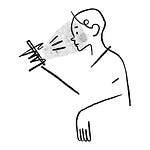Seth and Tsh are primarily writers; it’s the craft they know best and the work they love most. In this chat, they use the art of writing as a springboard to talk about the art of doing all sorts of creativity just for the sake of doing it, for the love of its beauty. Woodworking, music, gardening, even business and other forms of work… We all need to create beauty in our lives for its own sake. How do we balance the work necessary — and the need to earn a living — with the sheer beauty of why we love it in the first place?
Seth: Website | Newsletter | Twitter | Instagram
Tsh: Website | Newsletter | Twitter | Instagram
Leisure: The Basis of Culture, by Josef Pieper
Chef’s Table - Season 3, Episode 1
A Burning in My Bones, by Winn Collier
The Daily Poem podcast - Wendell Berry’s Sabbath Poem III episode
Scroll down for the transcript.
Tsh: This is A Drink With a Friend, I’m Tsh Oxenreider.
Seth: And I’m Seth Haines.
Tsh: Seth, what are you drinking today?
Seth: I am drinking coffee, as you would guess probably. It is not my favorite coffee and so I’m not going to name the brand but what I’ll tell you, I was going to say earlier, I’m drinking awful coffee but then that felt really rude to the brand. I won’t just say the brand name. My wife, Amber, came down with Covid this week, as you know. That’s why I was not on the podcast last week. As a result of that, my parents came up. They live about an hour away and they just brought us all these groceries, all this food. They are huge fans of dark roast coffee and I am just not. They brought a pretty good brand of coffee in this huge Sam’s Club bag of it but unfortunately, it’s dark roast. I’m using this afternoon as a drug but I’m not super enjoying it.
Tsh: I get it. It tastes burned, usually.
Seth: Sometimes you gotta do what you gotta do though.
Tsh: Kyle and I call it “church coffee”.
Seth: Yessss.
Tsh: It’s there. It’s available. We wouldn’t choose it.
Seth: And with a doughnut, it’s probably great but I don’t have a doughnut. What are you drinking?
Tsh: Back in the before times when we could be around people, I hosted a gathering of people, fifteen of my supporters/subscribers, whoever you want to call them, patrons. Which is amazing, they came into my town and we hung out for a weekend and it was the best. I loved it and I want to do it again. Anyway, who knows when that will happen again but in the meantime, one of them gave me a box of tea. It’s called Rare Tea Company and I have this habit, I don’t know if you guys do this, of saving good things as though the Queen is going to come instead of just enjoying the good things. I just decided today, you know what, today is a somewhat regular day and that’s good enough to have good tea. I’m drinking from Rare Tea Company, it’s called the Royal Air Force Association English Breakfast Tea for Heroes. It was put out by the RAF in Britain and it’s good. It’s plain old good English Breakfast Tea and it’s got a kick and I like it. That’s what I’m drinking.
Seth: I am a big tea fan and I need to drink tea more because it’s good for you. It’s good for your body, it’s good for your soul. It’s a soulful drink. Coffee, to me, is not a soulful drink. It’s a punch in the face.
Tsh: I’m trying to get better at drinking tea in the afternoon. After lunch is tea time. I’m not always great at it because I still like coffee enough to keep drinking coffee but this late in the afternoon I need to switch to tea.
Seth: Is that because you’re an Anglophile?
Tsh: Kind of. Largely. And because I get jittery. I can feel my heartbeat out of my chest if I drink too much coffee.
Seth: That makes sense.
Tsh: You and I are writers, primarily, in our work. We’ve said this before, we both enjoy this podcast but we feel like we are writers who podcast and not podcasters who write on the side. We think first and foremost of ourselves as writers and yet that doesn’t mean it doesn’t come with its own baggage of what does it mean to write, write well, why do we write, who do we become through writing. We want to unpack this idea a bit and not alienate our listeners, those of you who maybe don’t of yourselves as writers because there is something to be said about the reason we write that can translate to all sorts of life and reasons and people. Let’s talk about writing some.
Seth: Man, I would love to talk about writing. When we talk about writing I think one of the things that we can remember, and by that I mean we can remind each other, that when we talk about writing we’re really talking about artistic craft. Probably anything today can apply to any sort of artistic craft. I really enjoyed last week’s podcast with Kyle. I actually got a chance to talk to him today which was a lot of fun. One of the things that I said to him was I loved listening to him because he thinks totally different than I think and when he is doing any sort of craftsman work like fixing pipes or hanging drywall or whatever the stuff that he does that I can’t do, for him it’s so natural. It’s like praying. As we talk about writing today, I would assume that some of the things we’re going to say even apply to Kyle who is really good with his hands or maybe a painter who’s amazing with a paintbrush or maybe somebody who really loves business. Whatever the art you apply is I hope that some of what we talk about today applies.
Tsh: It reminds me of when we were in Italy back in 2014 and then Kyle and I talked about this when we went again, one of the reasons we like it there so much is because everything they do, they do from an artful perspective. I know I’m painting with a broad brush but it feels like that. Buying groceries is a form of art or making anything is a form of art so I think that’s what we’re talking about. Kyle is exactly that. He renovates the bathroom like it’s art and that’s why it takes so long when he does it but it’s also really good when he does it.
Seth: Right. As writers, there’s a whole range of writing that happens. There’s obviously personal writing that you do in your journal whether it’s a daily reflection or an examen or prayer journal or just a diary. There’s the personal writing. Then if you love the craft you’re probably telling stories a lot, maybe writing short stories or writing poems or maybe crafting a piece that would be magazine length or something like that. Then if you’re lucky, from time to time, you get paid to write something. Whether that is something that’s periodical length or whether that’s something that’s book form but that is a different kind of writing. When you’re writing for pay, you have deadlines. You have editors. You have idea pressures. You know this, you’ve experienced all this. You have all of these additional pressures that come along with it that’s just a lot different than writing something because you enjoy it. One of the things I find, and I don’t know if you found this, is that a lot of the folks that I know and that I really love as writers and I love to read their stuff, they’ll tell you all they do is write for pay anymore. It starts to drain them. It gets them tired. They still love it, it’s still a craft, it’s still a great job, particularly those who are able to do it full time. But at the same time, writing for pay all of the time drains you and it’s saps you of your creative energy. Have you experienced this?
Tsh: 100%. I’m experiencing it literally right now because I’m in the middle of writing my book on Lent, which I love. I love the liturgical calendar and the rhythms that it provides and so I have so much to say and yet, there is something as soon as it becomes an assignment, there is some kind of roadblock or wall, whatever metaphor you want to use that makes it hard to do. I was talking to my thirteen-year-old son about this who is naturally a story crafter, story creator. He lives in a book. He loves DND because of the world-building. He is just all about stories. As soon as his teacher gives him an assignment, he doesn’t want to write it. He says it’s because it’s an assignment. I laugh and tell him, dude, this is part of life. This is a thing you’re going to have to work on because welcome to the reality. But I get it, I totally get how that feels and that’s what it can do for me. I think so many people listening can identify with this idea of getting into a line of work that you love that feels like play or feels like art when you suddenly have to do it or are given restrictions like deadlines, it starts sucking the life out. Where’s the tension between still doing it because you like feeding your family and remembering why you love to do it in the first place?
Seth: I’m a little bit lucky and I’ve said this to others before, I’m a little bit lucky in that writing is not my primary vocation. I’ve written a couple of books. For five years I did a lot of co-writing, ghostwriting, editing. In those years, it really was my primary vocation but now it’s really not. My primary vocation, I split time between that and my day job which provides a whole lot more balance. What I used to tell people that I worked with all the time is that when it becomes your primary vocation and when you start writing for an editor and for an audience, you’ve got to be careful and you have to maintain the art somewhere else. You can’t leave the art form. You gotta do your day job, go do your day job but by the same token if you leave the love of the craft that you had in the beginning and you’re not doing that somewhere else, you run the risk of really burning out which as anyone who applies any trade or any art, that’s the last thing you want to do is burnout and end up hating your art.
Tsh: Isn’t it interesting though because I think we have this idea that’s the ideal, that’s the goal. How can I do this full-time for a living and nothing else? We don’t realize what it is we want, that it’s not what we think it is. It reminds me, literally yesterday, I had a meeting with my boss at the school where I teach. My writing is my main line of work, however, it’s not my only. I teach English to high schoolers. She was asking me what I was willing to do next year compared to this year so that they know their staffing needs. I had told her what I was willing to do and she’s really great and I just really like how she thinks. She said, no, are you sure? I want to make sure that you have enough time to write and to do your other job.
Seth: Oh, wow.
Tsh: Which is amazing but I did tell her that the thing I have learned because this will be if I continue doing it, which I hope to do, it will be my fourth year teaching. The thing I have learned in these four years is that I need this other gig because it makes my writing better.
Seth: Oh, yeah. Totally.
Tsh: Because all I was doing, I don’t want to say all I was doing, I was raising small children at home so that’s a whole thing. Once I started adding the additional vocation, I felt like not only was my writing better but I made better use of my time, practically. I didn’t just have open time to write. I found this quote this week that I thought, ooh, that is good. It’s from Frances Asbury who said, “My soul is more at rest from the tempter when I’m busily employed.” I think that’s true for me as a writer. I think I need all this free time like I need an open day with ten hours to write but actually, my soul is more at rest as a writer when I’ve got ten minutes before I have to wake up the kids. It’s such a weird thing.
Seth: Also, just tangentially, if you read a lot of the great writers and you look at their writing schedules, most of them all really wrote only three to four hours a day. You can’t do much more than that. When I was writing full-time, again, for the last five years, there’s a wall. You can’t just expend that much creative energy and expect to write eight hours a day, it’s ridiculous. You can’t do it. There’s that piece of it too and your vocation helps there.
One of the things that I’ve been contemplating is when you write for a particular audience and when you begin to tailor your voice to that audience particularly if that audience is a faith-based audience, you can really start getting into some mind loops. Well, I can’t say that because it will offend people. I can’t do this because then they’ll stop reading this kind of writing. When you start writing for people, for a market, you lose a sort of freedom. You lose a sort of ability to do something that’s fun and creative to you. Again, it’s like that in any endeavor. If you’re doing painting for a particular type, we saw this in Italy, right? If you are funded by a particular business person to create a painting and they say put my face in it, what are you going to do? Put their face in it, right? It’s all over in Florence. When you find yourself in that position, one of the best things that you can do is just take some time off. Break away and do something that is just for you. I don’t know if you know the story but Neil Young when he released his album, I think it was the album with Heart of Gold on it but I can’t remember. There’s an article floating out there somewhere about this. The next album that he did was a live album of original songs that no one in the crowd knew. It’s a masterful album but people ripped him to shreds at the time because they were like, capitalize on this momentum. Capitalize on this market that you’ve grabbed. He was like, no man, anytime I have a platform or a people eating out of my hands, I want to burn it down and start over because that’s where the creative freedom is. To that end, this is where this idea came from for us to talk about today, I have written two books and I do write in a certain way in a certain place but over the last eight years, I’ve been slowly crafting a novel that is really up to this point, has been just for me. I’ve really enjoyed it. I finished the editorial process this last week while Amber was in lockup.
Tsh: I saw that.
Seth: I had a little bit of extra time. When I was finished, I thought, this is the joy of my career. It may never get published. No one may ever read it. It may never see the light of day outside of some friends and family. As I walked away from it I thought, this is the joy of my career and now I have fuel to actually write something else if I want. I have space, I have creative freedom and if I want to go back and work on the things that I’ve been working on, I can. Because I’ve done something that was solely for me. I tell people all the time if I’m coaching them in writing, which I do a little bit of that, I’ll say write the book that you want to write. Don’t write the book under contract. Write your book and when you’re finished go get a contract if you want, or don’t. You’ve now written the book that you wanted to write. I think that’s really important in any craft. Carve out the space to do the thing that you want to do that cannot be influenced by the market or the demands of a boss or the demands of anyone. You have to create your own time to pursue your own art.
Tsh: I think it’s interesting that in our culture we don’t know how to do that anymore. It is so hard to give ourselves permission to do something just for fun or just for the beauty of it. The end result is to make beauty in the world, not for a paycheck. Our brains can’t even wrap our mind around it. There are those studies done in the 1960s that talked about how with the increase in technology we’re going to end up by the end of the 21st century with all this free time and who knows what we’re going to come up with. We don’t have free time, we’ve filled it with other things. I think we have lost the art of free time and really the art of leisure, which is probably a whole other conversation because I really want to talk about the real original meaning of leisure. Have you ever read the book by Josef Pieper, we’ve talked about this before. You know, I sent it to you guys over the summer. I don’t know if you knew that. Leisure: The Basis of Culture.
Seth: I’ve seen the book, I didn’t know where it came from. Maybe you sent it to Amber.
Tsh: It came from me. I sent it to Amber.
Seth: Alright, there you go.
Tsh: Fantastic book. Great philosopher. Basically, the idea is that leisure is what sustains us as a culture because the original meaning of leisure comes from the same root word as our root word for school. That is “restful learning”. The idea is literally learning but from a place of rest. I think that’s probably this idea of writing for the sake of what you want to write comes from. It’s not that it’s just like for fun and just play, it is play, but just like a kid, a little kid learns all the time through their play. It’s our version of that. We’re becoming more human, more who we need to be by giving ourselves the space to write from a place of leisure. Create whatever art it is we’re meant to create from a place of leisure.
Seth: I have one of these watches that tracks your stress, your heart rate, and your stress levels, and all these things. It seems like everybody has these nowadays. While I was actually editing this novel that I was working on, again, only for me, in my leisure time, just for the joy and the beauty of it. I can actually go back and look at my stress stats and see that while I was working on it, my stress levels were low. I would be working all day and I would have, I don’t have a high-stress life, it’s higher stress. I had a couple of arguments that day with some people and then that evening I was working on this piece of writing just for me and my stress levels plummeted. I was totally at ease, totally at home, totally cool where I was. Maybe that’s a piece of that leisure thing too? And a piece of doing art in your leisure. It really does help you blow off some steam. If it’s all just work, work, work all the time and you’re not using some of those same skills to enjoy the time and to make something beautiful, you’re not giving your body the chance to breathe and relax and to blow off some steam in some really healthy ways. I don’t know the psychology behind that but there’s got to be some.
Tsh: There 100% is I am sure. The thing we like to do around here is to peel back the top layer to look at the divine, the sacramental nature of this. To me, this feels like the sacramental art of creating in a way that mirrors our image of God. If we’re made in the image of God and that God is a creator and that’s one of the main reasons we create as humans, I can’t help but wonder if whenever we are in that flow where we are creating and we’ve lost track of time, or heart rate is at rest, and we’re doing it out of the love of whatever it is, the story we’re telling, that has to be a picture of how God creates the things we see. I was telling the kids the other day, if you think about it, God could have created us to not need food at all or to pop a bland pill, some kind of manna capsule just to keep us going and recharging us, but God made food delicious. God made food in such a way that he gave humans creative minds to come up with how to put the ingredients together to make them amazing. It seems like God cares about creativity just for the sake of creating. Because we don’t need it to taste good and yet it does. We don’t need literature or great storytelling and yet maybe we do because that mimics who we are in place of the divine.
Seth: Have you watched, I think we may have talked about it on this podcast, have you watched The Chef’s Table with the Buddhist nun?
Tsh: We have talked about it because you told me to see it, Emily P. Freeman has told me to see it, so I finally watched an episode. That’s exactly what I was thinking of.
Seth: Isn’t it amazing? In that episode, and I think everyone needs to go watch it. This is a woman who has set her life aside to live in this monastery and she is an amazing chef. She could go make enormous gobs of money using her trade for business, but she doesn’t do it. Instead, she stays and she cooks what she calls the monastery food. Just these simple dishes with simple ingredients that are absolutely gorgeous just on the plate. They are works of art on the plate. When you watch her, you can see here’s somebody who has not given herself to the whims of business, she has not sold her trade. She applies it in this way that’s very quiet and very humble. It’s a miracle that anyone ever heard about it. It’s artistic and beautiful for the sake of the artistry and the beauty. It brings a lot of joy to the lives of the people that she lives with. To me, that is the most beautiful moment, when you’re using your art and your craft to make your own life better and to make the life of the people around better. For us, the two of us, it would be writing a story that you’re not necessarily sending off for publication but that you’re sharing with your friends and your family. For a painter, it may be painting something that you sent to your mother. For a business person, it may be sitting down and advising a friend on a business deal that’s mucky and terrible and hard to pry apart. To me, I keep going back to this idea that I think art is done best when it’s not done for the money. There may be money as an ancillary benefit of that but it’s not done for the money. It’s not done for the platform. It’s not done for the Twitter people or the Instagram people or the Facebook people. It’s not done for your own ego. It’s actually done for the love of the craft. My question to you, because you write for money, too, is do you carve out time to do this kind of writing on your own?
Tsh: Yes and no. I need to be better at it. This conversation has been a kick in the pants reminder that I need to make time to do it because yes, I do it but not often enough. The little taste that I’ve done brings me so much joy that I remember why I like to write to begin with. I got into this gig as a writer pretty accidentally. I started off because, this is back in 2006, 2007, 2008, starting one of those blogs things because I enjoyed writing. We were living overseas and Kyle was like, you should write one of those blogs. I did and I never in a million years thought, finally, now I’m going to launch my career as a writer. I miss that purity of it. I definitely have writing that does not have a home because it was just something that I needed to get out. In my English classes, we do freewriting once and I tell the kids that this is a lot like when you are turning on a sink that has been turned on in a week and the water is rusty. You’re just clearing out the rust so that the water then becomes drinkable. It’s that idea, getting out these things so that I can really write. But I also just want to do that bit not because I just want to clear the cobwebs but because I actually want to give myself my best work and I don’t do that enough. Do you do that?
Seth: I try to. Like you, things get in the way. Life interferes. And like you, I write publicly so sometimes it’s a hard line to define. When am I writing for myself and when am I writing to be public. Sometimes it’s murky. I really do try to scratch some words every week that are just for me and sometimes it’s a poem and sometimes it’s scrap lines for something someday, one day, who knows where? It could be a scene. I have a big notebook that has scraps of scenes for stories that may or may not ever come together. I do try to do that a lot because I feel most at home when I’m writing. I feel most in myself when I’m writing. The last two weeks, I have an hour that I go to the church and I spend in silence and contemplation, and the last two weeks I’ve written poems. I’ve never felt more at home than when I’m sitting in silent contemplation with hopefully, communing with God and I’m also using this gift that I have to write something that speaks to me or that speaks of something in my life. I do that and I think it’s important that we all do that regardless of the craft. I get the sense, going back to Kyle, I get the sense that if he never made money from fixing stuff, he would still run around the house fixing stuff.
Tsh: Right. He can’t not. When we travel and we go to Airbnbs, he starts fixing things!
Seth: [laughs]
Tsh: He starts fixing squeaky doors and leaky faucets when we’re on vacation because he can’t help himself. He loves doing it. He’s not doing it to be obnoxious, it thrills him whenever he can help someone like that. 100%, you got it.
Seth: If there was something that this podcast could encourage people to do and could curate, it would be carving out the time to do the thing that you love for you, not for the recognition, not for the adulation, not for the platforming, not for all this stuff that frankly just props up a lot of the industry that we’re in, but just because you love it. Being a paid writer is never going to be enough. Being a wealthy businessman is never going to be enough. There’s always going to more you can do. There’s always going to be more you can achieve. If we could encourage our listeners to just step back and say, okay, I am doing some things for the pay and I am doing some things for the platform but what can I do that’s just between me and God? What can I do that just serves the people in my life and brings beauty to the people in my life because that’s what God has made me to do?
Tsh: As a little side benefit, I think ultimately doing those things, making sure that we make time for that, makes the vocation that’s more public, better. It gives us some depth. You know, listeners know for sure, wherever there is a reader who has published a book because they wanted to write a book or because they have a contract. Not because they have something to say. It’s not to throw a match on the whole publishing industry, it’s to say that we are inundated with people who create things because they want to create not because they have something to say. The people that I enjoy the most have this multi-dimensional life that they can use as soil with different minerals to fertilize so that good stuff can grow. It reminds me, I don’t know why I keep thinking of this, the actor Daniel Day-Lewis, I remember hearing about there was a long span of time where he didn’t do anything and I think I googled, where is Daniel Day-Lewis? This is ages ago. It turns out he was working as a cobbler in Italy because he wanted to. He went just to some little village where nobody would really care who he was and he just wanted to make stuff.
Seth: That’s amazing.
Tsh: I know, right? He wanted to go away and learn the art of making really great shoes and that’s what he did.
Seth: Maybe that’s what he does now?
Tsh: Who knows? Because he’s retired, right?
Seth: That’s right.
Tsh: To me, that really says something. I think of Wendell Berry who’s a farmer. I think of, there’s so many, Tom Hanks even. He does different things. These are more public names but even like neighbors. You think of the people in your life that are really interesting, it’s because they do other things to make their lives rich. I think that’s a good lesson for all of us.
Seth: Winn Collier, my dear friend, just came out with a book. It’s the authorized biography of Eugene Peterson. It’s called, A Fire in My Bones, I think? [Note from transcriber: it’s called, A Burning in My Bones]. It’s amazing. Winn got to know him over the years and said hey, could I write your biography and he said, yeah, sure. Why not? Right place, right time I guess? One of the things, you’re talking about Wendell Berry, even when you look at Eugene Peterson. He was not an author first. He was a pastor first. He would say I’m a pastor first. He was not a mega-church pastor. He was not doing it for the accolades or the platform. He was in a tiny church in the middle of nowhere and still did his “day job” faithfully and as a result, had a lot of things to say from the overflow of who he was. Actually, it’s funny because Winn is the same way. Winn wrote that book. He was a pastor in Virginia and doing his thing with his people and he wrote this book because he felt like that the story needed to be told and he loved Eugene and wanted to do it right and he did it right. Again, both of these guys wrote for money so it’s not like there wasn’t a money component there certainly. But the primary motivation for both of them and I can speak for Winn on this one, his primary motivation was not the paycheck. I don’t ever get the sense that Eugene’s primary motivation was for the paycheck. It was because of the love of the craft and there were things to say, as you’ve said, there were things to say. That comes through in the writing.
Tsh: What do you think is the takeaway? I’m curious about two things and then maybe this is another episode where we can get into the what does this mean for the publishing industry? As listeners might not be writers but most of them are readers, what does this mean about what’s being published and how do we support good writing and good art? But then also, what does that look like in our lives when we still need to feed our kids and pay our mortgages? Where’s the balance, do you know what I mean?
Seth: Yeah. I think I always want to start with the person, with the listener, with the you, the me. I think the first thing I would say is we have to be intentional to carve out space to engage our own craft just for the sheer beauty of the craft. If you’re not doing that, then don’t go try to build a platform based on your writing because the question I would ask you is are you doing it for the love of the beauty and the love of the craft or is there some other motivation? What’s in there, why do you need to do this? If you’re not just doing it for you, first things first, make sure that you take the time to carve out time to do that for yourself. I would say that, again, regardless of whether it’s writing or another form of art or music or business or whatever the thing is that you do, make sure that you’re carving out time to do something that is just beautiful for the love of the beauty. The second thing I would say about supporting good writing, seamless plug, maybe for all of us and our friends? Find good writing. You are a HUGE proponent of this. Find writers that you like and if they have platforms that you can support, support them. Whether that’s through Substack or subscribing to a newsletter. If you like it, join up. Follow along. Encourage them and encourage them to do beautiful work that is simply just beautiful, not for the platform. Keep encouraging them to do that because the more people demand that the more writers will listen.
Tsh: That’s right.
Seth: Keep demanding the good work, the deep work, the rich work, the work that comes from the overflow not the stuff that’s necessarily just Twitter fodder.
Tsh: I think for finding new artists it’s good to find those who you like who they are following and recommending. It’s not useful to see who has the largest following on Instagram to find who’s doing the real art that you want to see more of in the world. Consider perhaps word of mouth or asking a friend who seems to have good taste in books or music. Hey, what are you reading? Who should I read? Perhaps it’s a newsletter and they’ve linked to something, take that step and go down that rabbit hole of some good work that’s being put out there regardless of what they say on Twitter or even if they are on Twitter. Be intentional about looking out for those people. There are a lot of people doing really great work that are just quietly showing up and doing their thing and I think we forget that.
Seth: I stumbled across, and we talked about this a couple of weeks ago because I’m still finishing up her book. I stumbled across Heather King’s blog and I’m a prime example of that. I feel like she is just quietly doing really amazing work. I’m excited about that. I’m excited to say I’ve now read her blog and I’m reading her books and she’s not splashy, she’s not flashy. You don’t see her out there trying to build something based on her ego. I love that. It feels quiet and worth reading.
Tsh: It’s good. I think we’re all hitting that point where the Internet is at a fever pitch where we just can’t handle any more noise and this is the antidote, I think. It’s not that the Internet needs to be burned down, we just need to find those quiet spaces.
Seth: And dig in.
Tsh: Speaking of good work, good art, what are you reading, watching, or listening to these days?
Seth: This is going to be really funny because Amber has been laid up in bed and so I have had two books that I’ve been reading and a show. It was really hard to pick between these and this is going to be really awful because you are about to see how dark and twisted I truly am.
Tsh: Alright.
Seth: I’ve been watching Murder Among the Mormons on Netflix.
Tsh: I’ve never heard of it.
Seth: It’s really funny because I was thinking about this before I came on because it’s like, hey, what’s something that you’re reading, watching, or listening to that’s bringing truth, beauty, or goodness to your life? Well, this seems like a stretch, right? It was really fascinating and I won’t give away any spoilers but it was really fascinating to watch somebody who has a very, very specific innately God-given talent and use it for bad. As I was watching it, the whole time…
Tsh: [laugh]
Seth: I know, it sounds like I’m going in the wrong direction with this, doesn’t it?
Tsh: But I get it.
Seth: As I was watching it, I was thinking we all have these gifts and talents that we can use for good purposes, for evil purposes, for neutral purposes, for sacramental purposes and it actually really led me to contemplate a lot of my own work, the gifts and talents that I have and use and how am I using those neutrally, how am I using them for good, or maybe even how am I using them for evil? Not that I’m doing anything nefarious.
Tsh: Sure.
Seth: There are no bodies in the basement. I don’t even have a basement. For me, it was the Mormon murder show on Netflix.
Tsh: Okay, good. I like it.
Seth: I can’t say I highly recommend it if you’re looking for truth, beauty, or goodness unless you’re going to take a circuitous route to get there like I did.
Tsh: Is it true crime or is this fiction?
Seth: Oh, totally true crime. Amber hates true crime.
Tsh: I do too, actually.
Seth: The only time I get to watch it is when she’s sick. Three episodes, I just did it.
Tsh: I get the connection now.
Seth: It took me a minute to get there, didn’t it? You knew where I was going.
Tsh: That’s alright, I get it. I was trying to figure out what does Amber being in quarantine have to do with Murder Among the Mormons, now I get it.
Seth: That’s exactly what it has to do with it. What are you reading, watching, or listening to that is bringing some goodness, truth, beauty to your life?
Tsh: I think you are going to like this if you haven’t yet. There is a podcast called The Daily Poem. It’s put out by CiRCE who I really like as a company. It is exactly what it sounds like, it’s a poem a day. Just about every episode is under ten minutes so it’s not long and drawn out. It is done by David Kern, what he does is he reads a poem and then he has some thoughts about it, either his own thoughts and commentary but not in an obnoxious way, in a thoughtful way. Or he will springboard off that poet and read something that they wrote about that poem to give some context and depth and then he’ll read by reading it a second time. It is one poem a day and it’s fantastic. This morning was literally from Wendell Berry. It was Sabbath III and it was written in 1994 and I read it driving down the highway on the way to get my Covid shot and it just felt really, there was a juxtaposition to everything going on because it felt so utilitarian what I was doing and yet I needed to hear this farmer talk about Sabbath. He ended, the last line of that poem is, “We live the given life, not the planned.” I needed to hear that exactly then. I needed to hear, “We live the given life, not the planned.” I was not expecting that in my errand running today. That’s exactly what The Daily Poem does, it gives you that shot of poetry that you didn’t know you needed. It’s a daily listen for me. I really have grown to appreciate it.
Seth: That’s amazing. How long is it?
Tsh: Each episode you mean?
Seth: Yeah.
Tsh: Six to ten minutes, maybe. It’s super short. It’s really great.
Seth: It’s brilliant.
Tsh: Isn’t it great? It’s such a good idea. I know it’s not the only podcast out there like that but that’s my favorite one. There’s no catchy theme music at the beginning, it’s just a guy who’s reading a poem thoughtfully and that’s what I needed.
Seth: Do you have Berry’s Sabbath poems?
Tsh: I don’t. I need them.
Seth: You must. Everyone must. Everyone here must.
Tsh: That dang Wendell Berry.
Seth: Dang ole Wendell.
Tsh: It’s time for us to wrap this up. We would love to hear from you. Actually, you guys have been leaving us voicemails. I need to incorporate them more in the show. I think we’re going to start doing that. Thank you for leaving us voicemails. Keep doing that, leave us a voicemail at (401) 684-GOOD sharing one thing that’s pointing you to more beauty, or goodness. We would love to feature you on the show. You can also find a link for this episode, as well as episode show notes and transcripts, at adrinkwithafriend.com. If you want to support the show you can do so at buymeacoffee.com/drinks — this is where you can pick up the next round of drinks for just a few bucks, which helps keep the lights on around here. We also have a Substack which you can find at adrinkwithafriend.com and we’re going to be building that up in the very near future and I’m excited about that. You can find me at tshoxenreider.com. Seth, where can people find you?
Seth: Hey, I finally did it. You can find everything you need at sethhaines.com.
Tsh: Nice. Way to go. Music for the show is by Kevin MacLeod, editing is by Kyle Oxenreider, and Caroline TeSelle is our transcriber and assistant. I’m Tsh and Seth and I will be back here with you soon. Thanks for listening.












